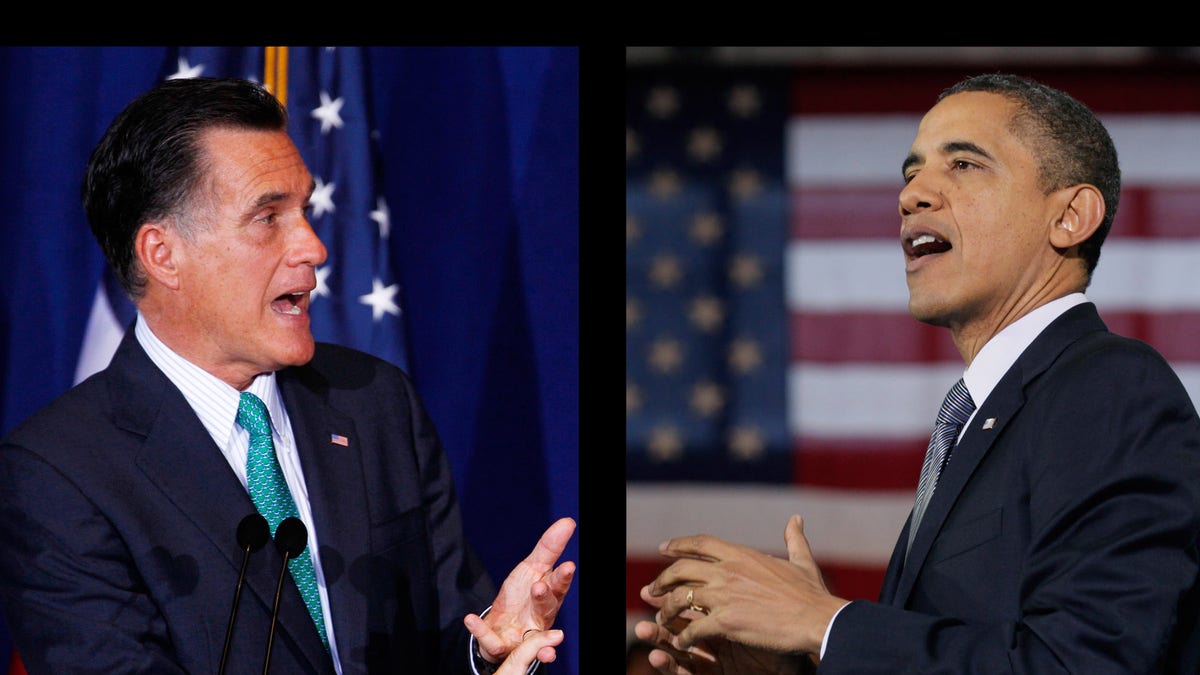
Then-Republican presidential nominee Mitt Romney and President Barack Obama in 2012. (AP)
Election-deciding events are what happen while presidential candidates are busy making campaign plans.
Events over the past several days have forced both presidential candidates to show strength and clarity in foreign policy -- perhaps to the advantage of President Obama, who critics say has a weak economic record. Republicans, though, have also sought to portray him as weak on the world stage.
“The American people are focused on the disaster of the economy, ” said Danielle Pletka, a foreign policy expert with the conservative leaning American Enterprise Institute. “But as we learned this week, there’s disaster waiting around every corner abroad as well.”
The unanticipated events Tuesday in Libya and Cairo in which U.S. Ambassador Christopher Stevens and three other Americans were killed is just the latest example of an event overtaking carefully scripted campaigns.
Both candidates publicly responded to the killing in February of Florida teen Trayvon Martin. The mass movie theater shooting in Colorado over the summer forced the candidates to temporarily dial back their campaigns. Most recently, foreign affairs have crept in -- there was a flurry of statements Tuesday after Israeli Prime Minister Benjamin Netanyahu apparently offered to meet with Obama and was turned down. Then came the attacks in Egypt and Libya, which quickly overshadowed everything else.
The Obama campaign’s desire to play up the president’s foreign policy strengths appeared on full display last week at the Democratic National Convention – especially during the closing night speeches of Vice President Biden and Sen. John Kerry, chairman of the Senate Foreign Relations Committee.
Biden attempted to recreate a picture of Obama as the proven commander in chief when making the Oval Office decision to kill Usama bin Laden.
Kerry, D-Mass., simply said, “Ask Usama bid Laden if he’s better off that he was four years ago.”
Obama concluded the night by reminding Americans about his foreign policy successes, including a greatly diminished Al Qaeda, then said, “My opponent and his running mate are new to foreign policy. But from all that we've seen and heard, they want to take us back to an era of blustering and blundering that cost America so dearly.”
The moments following the death of the Americans this week in Cairo and Libya showed just how difficult finding the right message can be – as both candidates worked to get it right.
The White House distanced itself from an early statement from the U.S. Embassy in Cairo about an anti-Islam video that may have sparked the violence. The statement in part condemned "the continuing efforts by misguided individuals to hurt the religious feelings of Muslims.”
The Romney campaign issued a statement calling that response "disgraceful," and Romney on Wednesday stood by his initial statement.
Darrell West, director of Governance Studies at the liberal-leaning Brooking Institute, thinks Romney took a big political risk in his fast and highly critical response to how the White House handled the situation.
“The $64,000 question is how this will play out with voters,” West said. “At a time of crisis American typically has one voice. Foreign policy is a long game. It’s a complex world in which the first response will not always be the right response.”
Republican strategist Taylor Griffin said Wednesday the events are a good opportunity for Romney to show leadership but any shift from the economy to foreign policy would be to the president’s natural advantage.
“The country always defers to the president in the case of a foreign policy crisis,” said Griffin, a partner at Washington-based Hamilton Place Strategies. “And the Obama campaign would be much happier talking about foreign policy -- as tragic as the events were.”
Romney this summer sought to play two aces in his foreign policy hand – his strong connections to the U.S. Olympics and to Israeli Prime Minister Benjamin Netanyahu.
Romney, who led efforts to pull off the successful 2002 Salt Lake City games, traveled first to London for this year’s summer games, then to Israel, where he reunited with long-time acquaintance Netanyahu, who appears to have a trying relationship with Obama.
"We should employ any and all measures to dissuade the Iranian regime from its nuclear course,” Romney said while in Israel. “We recognize Israel's right to defend itself, and that it is right for America to stand with you."
Israel claimed Tuesday that the White House rejected an offer to meet with Netanyahu after as part of his scheduled visit to New York later this month. The White House issued a qualified response about the time and location, but the president still has no plans to meet with the prime minister.




